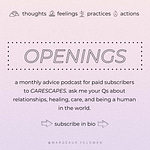Hello dear ones. As always, it’s an honour and a privilege to receive your questions each month. Today we’ll be talking about attachment wounding and how to show up for others and ourselves as we try to heal our relational wounds.
A reminder that this offering is available to all subscribers, as paywalls don’t really align with my values. It’s my hope that folks who can do so will become paid subscribers and help sustain me and this project.
I’d love for you to submit your questions for episode 7, and you can do so by sending me an email at hello@margeauxfeldman.com with the subject line OPENINGS SUBMISSION. and I've asked that you try to keep your questions to 200 words or less. All right with those business matters. I'm going to transition into our first question.
Our first question:
Today in yoga class, a pose triggered an intense emotional response within me. I suddenly remembered how I stopped making an effort to talk to my best friend from middle school when we started going to different high schools an hour apart. I avoided our relationship because I loved him and I didn't want to deal with the pain I felt. Tears were running down my face in class, and as soon as I got home I started sobbing. How do I heal from my avoidant and disorganized attachment styles? I keep losing relationships with people who I dearly love because I stop showing up when things get hard.
Before I answer this question, I want to offer a few quick explanations of attachment styles. Just so all of us feel like we're on the same page. Avoidant or dismissive attachment is marked by the desire to move away from connection. Folks with avoidant attachment are overly self-reliant, keeping others at arm's length. They find it challenging to be openly emotional with others and struggle to be present with others' emotions. And they struggle to identify feelings and sensations when present, believing that they don't have feelings or needs. Anxiously attached people will cling to connection at all costs. They experience intense anxiety regarding the level of closeness with others, constantly monitoring others' moods and adapts/erases needs to ensure that the other's needs are prioritized. They have a hard time trusting that loved ones truly love them and needs constant reassurance. And they quickly bond with others, often misses red flags.
Disorganized attachment is a party mix of both anxious and avoidant. Folks with disorganized attachment move back and forth between “I want you, I want you, I want you,” and “get away from me!” They have a hard time discerning the difference between safety and danger because their caregivers were threatening, scary, or abusive. They have come to understand love as chaotic and unsafe, and have a tendency to blow up safe and secure connections. If you wanna learn more about attachment styles, check out Jessica Fern’s book Polysecure – which I feel like I recommend in every episode of OPENINGS.
I’m so struck by the fact that you had this revelation during yoga class. When it comes to changing a pattern and building new skills, I think about stretching our muscles. If we’ve spent our whole lives with our shoulders hunched inwards, it’s going to hurt when we do a backbend for the first time. And even when the pain eases, it will likely feel quite uncomfortable. The same is true when it comes to healing our attachment wounding. If we’ve been protecting ourselves by running away from connection, then it is going to feel pretty terrifying when we choose to stop running and move towards the other person.
There are a few reasons for this. The first is neurological. Our attachment styles are survival responses that we learnt at an early age and take shape in behaviours and actions that have quite literally been hardwired into our brains’ neural pathways. The amazing thing about our brain is its neuroplasticity: we can create new neural pathways throughout our entire lives. The other reason this work is so challenging is because our trauma brain hates change. Change = unfamiliar = dangerous. We keep ourselves safe through familiarity. So even though the thing you desire so much is secure attachment, that is unknown territory. Avoidant and disorganized attachment, however, are deeply familiar.
With all of that preamble out of the way, I want to answer your question: How do I heal from my avoidant and disorganized attachment styles? Here’s the deeply annoying answer: you do the scary thing and stop running away. Of course it’s more complicated than that. Healing from avoidant attachment involves learning to feel our feelings and express them to others; reaching out for support even when you feel it’s safer to just do the thing on your own; and not running away in the face of overwhelming feelings. When it comes to disorganized attachment, I’ve spent a lot of time rewiring my safety mapping. Safety mapping is a term I learnt from Kathy Kain and Stephen Turrell’s book Nurturing Resilience and it explains how we learn to distinguish safety from danger. As a teenager and young adult, anytime someone showed up with secure attachment, I fled. The safety they were offering felt dangerous because I learnt that safe people (e.g. my dad) were dangerous. I had to spend a lot of time learning to be with my fear and not make choices from a place of dysregulation. I had to help my attachment system see that secure attachment was what we wanted and that the danger we felt was actually a trauma response.
If this is something you feel like you’d like some support with, I want to share that applications for Intimacy for Trauma BBs, my 8-week long peer support container will be opening on September 8th. I’ll share the link to find out more in the transcript. Also, if you’re able to access therapy and can find someone who works on attachment trauma, that has honestly been such a gamechanger for me. Also, Polysecure and my other fav attachment book, The Power of Attachment, both have some useful, practical tools that you can easily do on your own.
Here’s our second question:
My entire life I have been a very soft-hearted girl. I am a cancer and I have always been incredibly relationship-oriented. While I now am not so desperate to be loved that I will bend my important boundaries for people or settle for someone who can’t meet my needs, I still feel that hunger. I’ve been in therapy for years and work hard in and out of it to raise my self-worth, but I crave the healing that I know would happen in a healthy romantic relationship and am ready for it. I hate being single, no matter how much I try to practice radical acceptance, self-compassion, and to look at the benefits of it. I’ve been trying to let my severe childhood relational trauma be healed from myself and from the great non-romantic relationships I have in my life, but romantic relationships are the closest in intensity and how they impact you after parental/care-giver relationships, at least in my case especially because I need the missing experience of physical touch. How can I handle knowing that relational healing requires relationships, but being single and unable to access that romantic relationship healing that I know would help me so much?
Wow, as a fellow soft-hearted Cancer, I so resonate with what you’ve shared here. Literally last week I was saying to my bestie “I’ve done so much fucking work healing my attachment trauma in therapy. Why am I still single??? I am ready for the relationship of my dreams!!!” And I just want to celebrate you – and me – for getting to a place where you are honouring your boundaries and not settling for relationships that aren’t going to meet your needs. That is HUGE work.
I think it’s super important to name that we live in a world that has taught us that being single – especially if you’ve been socialized as a woman – is literally the worst thing ever. And so even outside of your relational desires and wounding, it makes sense that you hate being single. Also, as someone who has a lot of touch hunger, I feel you.
One thing that I learnt a few years ago – right before / as the pandemic was hitting – is that no amount of relational healing will be enough for me to heal my relational wounds. Now that might sound like a terrifyingly sad statement. But here’s the good news: we can heal relational wounds through our relationship with ourself and all of the little ones that live within us. I say this as someone who has healed SO MUCH through my relationships with my two best friends, and through safe, secure, and loving partnerships. Even with those experiences, every time I start to date someone new, my attachment wounding gets activated. No amount of verbal reassurance from loved ones has been able to stop that activation from happening.
Because here’s another hard truth: we cannot control whether another person will show up and give us the love, care, and affection that we so desire. The good news is that we can show up for ourselves. Our relationship with ourself is within our control. I have spent countless therapy sessions talking to adolescent and teenage me, showing them that there is an adult self present here now (me!) and they’re not going anywhere. It might sound at first like a paltry offering when all you want to have is a beautiful queer trans romance built upon secure attachment and lots and lots of hot sex (hi, that’s me!). What I’ve found though is that learning how to show up for myself, romance myself, touch myself, has enabled me to enjoy being single.
Yes, there is still more healing to do, and some of that healing will happen through romantic relationships (I hope). I say “I hope” because the other shitty truth is that romantic relationships can also wound us. But on my most optimistic days, I know that the work I’m doing right now is helping to build the relational foundation I need, want, and deserve. For whatever reason, the universe has decided that being single, and having numerous failed attempts at intimacy, is my journey for this moment. I hate it and I’m learning to accept it.
I know that I haven't really been able to answer your question, but I hope that my reflections have offered some comfort in knowing that you are not alone on this journey. That's all I've got for this episode of openings. Thank you, thank you, thank you for your questions for trusting me and giving me space to offer some of what I know to be true. It doesn't all have to resonate. Take and leave what works for you. Again, if you have a question that you'd like me to tackle, you can submit your question to me at hello@margeauxfeldman.com with the subject line OPENINGS SUBMISSION. And I look forward to being back with you in October for the next little mini podcast. Sending you all so much softness. And yeah, just love and appreciation. Okay, bye.
Learn more about Intimacy for Trauma BBs here!







Share this post